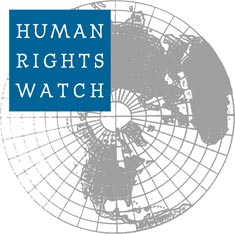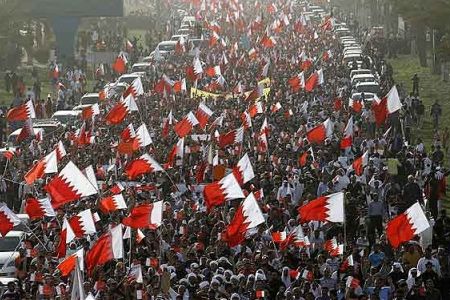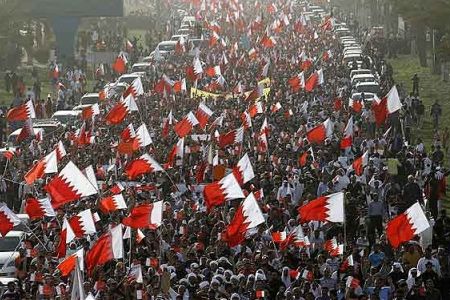Human Rights Watch on Wednesday accused Bahrain of carrying out a "campaign of violent oppression" against citizens and called for an end to abuses.
 Human Rights Watch on Wednesday accused Bahrain of carrying out a "campaign of violent oppression" against its citizens and called for an end to abuses.
Human Rights Watch on Wednesday accused Bahrain of carrying out a "campaign of violent oppression" against its citizens and called for an end to abuses.
Pro-reform protesters took to the streets of Bahrain on February 14, but security forces crushed the demonstrations a month later in a bloody crackdown followed by sweeping arrests.
The authorities said 24 were killed in the unrest.
"The Bahrain government, since March 2011, has been carrying out a punitive and vindictive campaign of violent repression against its own citizens," HRW said in statement.
"Bahrain has brutally punished those protesting peacefully for greater freedom and accountability while the US and other allies looked the other way," HRW's deputy Middle East director, Joe Stork, was quoted as saying.
HRW called on "the Bahrain government to end unlawful and incommunicado detention, to free protesters unless legitimate criminal charges can be brought against them, and to allow monitoring by independent human rights organizations."
The New York-based rights watchdog said it has been prevented from working in Bahrain since April.
 In the meantime, Bahraini protesters have staged new demonstrations against the Al Khalifa rule after leaders of two opposition parties attended a reconciliation meeting with the Manama regime.
In the meantime, Bahraini protesters have staged new demonstrations against the Al Khalifa rule after leaders of two opposition parties attended a reconciliation meeting with the Manama regime.
Latest demonstration took place in north Sehla district, south of Manama, in a protest against the negotiation table, which is reportedly aimed at putting an end to the political crisis in the monarchy, local sources said on Wednesday.
Leaders from only two of the opposition groups, al-Wefaq and al-Waad participated in the so-called national dialogue despite a boycott of the meeting by other opposition groups, including Haq Movement and Bahrain Free Movement.
An opposition figure who spoke on condition of anonymity said no dialogue can solve the situation in Bahrain until people are able to elect their government and see an end to what they call the systematic discrimination against the Bahraini majority.
The opposition leaders argue that Bahraini authorities must end the protest-linked “show trials” and release the detainees before a serious dialogue can begin.
The talks come after Bahrain's King Hamad bin Isa Al Khalifa called for a national dialogue on reform and announced investigation on Saudi-backed regime forces handling of the uprising.
Scores of protesters have been killed -- several under torture -- and many others detained and transferred to unknown locations during the regime's crackdown on protesters.
According to Bahrain Center for Human Rights, a non-governmental organization, there are currently over 1,000 political detainees, including medical staff, inside the country.
